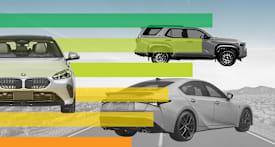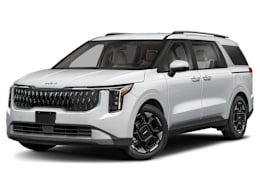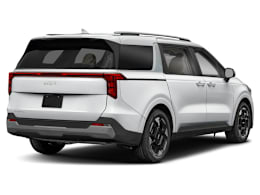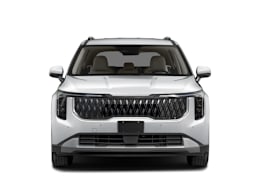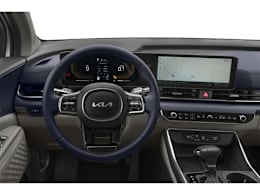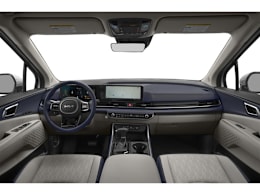Kia’s roomy, comfortable, and refined Carnival—the automaker’s successor for the Sedona—did very well among minivans in our testing. Apparently “minivan” is a bad word in Kia parlance, though, as the automaker seems dead-set against using the term; instead, it refers to the Carnival as an “MPV,” or “multi-purpose vehicle,” in its marketing.
The Carnival’s 287-horsepower V6 has plenty of predictable and usable power, and the polished driving experience is aided by a smooth-shifting eight-speed automatic transmission. As with other V6-powered minivans, the Carnival easily chirps the front tires leaving the line; unlike the Chrysler Pacifica and Toyota Sienna, it isn’t available with all-wheel drive. Like its V6 rivals, the Carnival’s 21 mpg overall is far outmatched by the Sienna hybrid’s 36 mpg overall. A hybrid version of the Carnival is new for 2025.
Although the Carnival doesn't shine in terms of agility, it proved balanced and controlled through our avoidance maneuver—which simulates swerving quickly to avoid a vehicle or obstacle on the road—and posted a commendable speed. Its suspension takes the edge off bumps nicely, and the cabin stays quiet, though there was some extra wind noise from the large side windows at highway speeds.
The Carnival’s front seats are wide, supportive, and comfortable for the long-haul. But while the second-row seat has lots of headroom, thigh support could be better; high-end versions come with heated and ventilated second-row seats with a reclining, lounge-style feature. The third row is low and firm but fairly roomy, and more comfortable than the Sienna’s.
One of the few Carnival downsides is that the heavy second-row seats are a chore to remove when looking for maximum cargo space. But, we like that the middle section of the second row can slide forward and backward on a long track, aiding seating flexibility; for instance, this makes it possible to place a child closer to the parents up front, or so that three adults don’t have to rub shoulders.
Controls are mostly easy to use, though the capacitive-touch climate “buttons” aren’t as straightforward to press as physical ones. The controls for the sliding side doors and liftgate are also inconveniently placed on the lower left of the driver’s dash instead of on the overhead console, so they’re impossible for the front passenger to reach. Storage between the front seats is a bit scant compared to some other minivans, but the wireless phone charging is handy, as are the USB ports in all three rows.
Forward collision warning, automatic emergency braking with pedestrian detection, blind spot warning, rear cross traffic warning, and lane keeping assistance come standard. Adaptive cruise control now comes standard for 2025 models.

